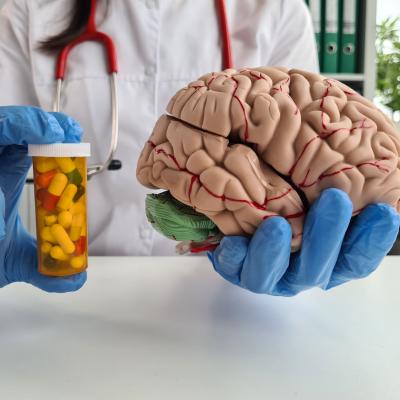Anúncios
The placebo effect is a surprising phenomenon in medicine that shows how the mind can influence the health of the body. When a patient believes they are receiving an effective treatment, real changes can occur, even if the treatment is inert. Understanding this effect helps improve medical care and enhance healing.
The placebo response involves complex psychological and physiological processes that occur due to the patient’s expectations. These mechanisms can relieve symptoms, such as pain and anxiety, even without the action of active substances. Science is still investigating how factors like communication and environment interfere with the efficacy of the placebo.
Anúncios

How the placebo effect works in medicine
The placebo effect is a fascinating phenomenon in medicine, where a patient experiences a perceived improvement in their condition after receiving a treatment without therapeutic value. This effect highlights the complex interaction between mind and body, demonstrating that our beliefs and expectations can significantly influence health outcomes. Understanding how the placebo effect operates is crucial for health professionals and patients, as it can lead to more effective treatment strategies and enhance the healing process.
At the core of the placebo effect are the psychological and physiological responses triggered by belief in the treatment. When a patient believes they are receiving a legitimate medical intervention, their brain can release neurotransmitters and hormones that mimic the effects of real medications. This response can result in real changes in the body, such as pain relief or mood improvement, even when the treatment itself is inert. The mechanisms behind this effect are complex and involve factors such as patient expectations, the doctor-patient relationship, and the context in which the treatment is administered.
Research shows that the placebo effect can be influenced by various variables, including the type of condition treated, the patient’s previous experiences with treatments, and even the appearance of the placebo. Studies indicate that more expensive or branded placebos tend to produce stronger effects than generics, probably due to the perceived value associated with them. Moreover, how a healthcare professional communicates with the patient can significantly impact the placebo’s effectiveness, since positive and empathetic interactions can increase the patient’s belief in the treatment’s efficacy.
In clinical trials, the placebo effect represents a unique challenge for researchers. To accurately assess the efficacy of a new drug or therapy, it is essential to differentiate between the real effects of the treatment and the psychological benefits derived from the placebo response. This is often achieved through double-blind studies, where neither participants nor researchers know who is receiving the active treatment and who is receiving the placebo. By controlling the placebo effect, researchers can obtain more reliable data on the true efficacy of new medical interventions.
What is the placebo effect and how does it work

The placebo effect occurs when belief in the treatment generates real benefits, even though it has no active ingredient. This interaction between mind and body reveals the importance of perception in recovery. The brain releases chemicals that mimic medications, promoting positive sensations.
Additionally, the patient’s expectation can influence the immune and neurological response. When a patient trusts the treatment, the body may respond with symptom improvement. The relationship between doctor and patient is also a factor that enhances the placebo effect.
Another important point is the context in which the treatment is applied, including the environment and communication. The placebo effect can vary according to the type of disease and the patient’s previous experience. Studying these aspects helps use this effect consciously.
Finally, the placebo effect is a complex phenomenon that goes beyond the simple administration of a treatment. It shows how the mind shapes physical health and highlights the value of the psychological aspect in medical care.
Advantages of understanding the placebo effect and its surprising medical power
Understanding the placebo effect offers numerous advantages for both health professionals and patients. One of the main benefits is the potential to improve treatment outcomes without relying exclusively on pharmacological interventions. By recognizing the power of the mind in the healing process, health professionals can implement strategies that harness the placebo effect to enhance patient care. This can lead to less dependence on medications, minimizing the risk of side effects and drug interactions while still achieving positive health results.
Furthermore, awareness of the placebo effect can promote a more holistic approach to medicine. Instead of viewing treatment as a purely biological process, health professionals can appreciate the importance of psychological and emotional factors in patient recovery. This shift in perspective encourages professionals to engage with patients on a deeper level, fostering trust and empathy, which can further increase the effectiveness of treatments. By prioritizing the patient’s experience, health professionals can create an environment conducive to healing.
Another advantage of understanding the placebo effect is its potential to improve patient adherence to treatment regimens. When patients believe in the efficacy of their treatment, they are more likely to follow prescribed therapies, attend follow-up appointments, and adopt healthy lifestyle changes. This increased adherence can lead to better health outcomes and a greater overall sense of well-being. Additionally, patients who feel empowered by their treatment tend to be more proactive in managing their health, resulting in a more engaged and informed patient population.
Finally, recognizing the placebo effect can also inform the design of clinical trials and research studies. By considering the psychological factors that influence treatment outcomes, researchers can develop more robust methodologies that account for the placebo response. This can lead to more accurate assessments of the effectiveness of new therapies and ultimately contribute to the advancement of medical science. Understanding the placebo effect is not just a curiosity; it is a vital component of modern medicine that can improve patient care and health outcomes.
How to harness the placebo effect for better health outcomes
Harnessing the placebo effect for better health outcomes involves several strategies that can be integrated into patient care. First, improving the patient’s perception through positive communication is essential. When health professionals convey optimism and confidence in the treatment offered, patients are more likely to believe in its effectiveness. This can be achieved through clear explanations, empathetic interactions, and active listening, all contributing to building trust and empathy between provider and patient.
Secondly, utilizing the mind-body connection in treatment plans can significantly increase the placebo effect. Incorporating techniques such as mindfulness, meditation, and visualization can help patients access their mental resources to support the healing process. By encouraging patients to engage with their thoughts and emotions, health professionals can promote a greater sense of autonomy and empowerment, which can amplify the effects of any treatment they receive.
Another effective strategy is to incorporate alternative treatments alongside traditional methods. Many patients are open to complementary therapies, such as acupuncture, chiropractic care, or herbal remedies, which can enrich the overall treatment experience. By offering a variety of options, health professionals can meet patients’ individual preferences and beliefs, increasing the likelihood of positive outcomes. This integrative approach acknowledges the diverse ways in which patients may experience healing and well-being.
Designing clinical trials that consider the placebo effect is also crucial for advancing medical research. By including placebo groups and carefully monitoring patient expectations, researchers can obtain more accurate data on the efficacy of new treatments. This not only improves research quality but also helps establish a more nuanced understanding of how psychological factors influence health outcomes. As a result, the medical community can develop more effective therapies that harness the power of the mind and body.
Educating patients about the psychological impact of their treatment is another fundamental aspect of harnessing the placebo effect. When patients understand that their beliefs and expectations can influence their health outcomes, they may be more inclined to adopt a positive mindset and actively participate in their healing journey. Providing information about the placebo effect can empower patients to take control of their health and encourage them to engage in practices that support their overall well-being.
Lastly, promoting a healing response through supportive environments can increase the placebo effect. Creating spaces that promote relaxation, comfort, and positivity can significantly impact the patient’s experience during treatment. This can involve everything from the physical environment of a healthcare facility to the emotional support provided by family and friends. By cultivating a welcoming atmosphere, health professionals can help patients feel more at ease, which can boost their belief in the effectiveness of their treatment.
Did you enjoy learning about the placebo effect and its surprising medical power?

The placebo effect is a remarkable testament to the power of the mind in influencing health and well-being. By understanding how this phenomenon works and recognizing its potential benefits, both health professionals and patients can work together to improve treatment outcomes. The interaction between belief, expectation, and physiological response is a fascinating area of study that continues to reveal new insights into the healing process.
As we continue to explore the complexities of the placebo effect, it becomes increasingly clear that our perceptions and beliefs play a crucial role in shaping our health experiences. By harnessing this knowledge, we can pave the way for more effective and holistic health approaches that prioritize the mind-body connection.
Frequently Asked Questions
What is the placebo effect?
The placebo effect is when you feel better just because you believe a treatment will work. It’s not real, but your brain thinks it is!
How does the placebo effect work?
It works because your mind influences your body. When you believe something will help, your body can actually respond positively.
Can the placebo effect be powerful?
Yes! The placebo effect and its surprising medical power can even relieve pain and improve health. It’s amazing what the mind can do!
Are there risks in using the placebo effect?
Generally, no. But it’s important to remember that the placebo effect does not replace real treatments when you need them. Always consult a doctor!
Can the placebo effect work on anyone?
Yes, most people can experience the placebo effect. It can vary from person to person, but belief is key!
